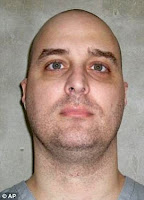 |
| Michael Hooper |
An Oklahoma death row inmate who tried to delay his execution by challenging the state's lethal injection method was executed Tuesday evening just hours after the U.S. Supreme Court refused to step in.
Michael Hooper, convicted for the December 1993 shooting deaths of his former girlfriend and her two young children, received a lethal dose of drugs at the Oklahoma State Penitentiary in McAlester. The 39-year-old was pronounced dead at 6:14 p.m., according to the Department of Corrections.
Hooper was sentenced to death for killing 23-year-old Cynthia Lynn Jarman and her 2 children, 5-year-old Tonya and 3-year-old Timmy. Prosecutors alleged that the victims were with Hooper in a pickup truck in a mowed field when he placed a 9mm pistol under Cynthia Jarman's chin and shot her, then shot the children to prevent them from being witnesses.
Each of the victims was shot twice in the head, and their bodies were buried in a shallow grave in a field northwest of Oklahoma City.
Hooper had sued the state last month in an effort to halt his execution, claiming that Oklahoma's three-drug lethal injection protocol was unconstitutional. The lawsuit sought to force the state to have an extra dose of pentobarbital, a sedative, on hand during his execution.
Pentobarbital is the 1st drug administered during lethal injections in Oklahoma and is used to render a condemned inmate unconscious. It's followed by vecuronium bromide, which stops the inmate's breathing, then potassium chloride to stop the heart.
Hooper's attorney, Jim Drummond, had argued that if the sedative were ineffective, the remaining drugs could cause great pain in violation of the Eighth Amendment's prohibition against cruel and unusual punishment.
The lawsuit also noted that other states have adopted a 1-drug process using a fast-acting barbiturate that supporters say causes no pain.
But his request to stall the execution was rejected by a federal judge, then upheld by a federal appeals court. And the U.S. Supreme Court rejected Hooper's request without elaboration just hours before his execution.
Hooper becomes the 4th inmate to be put to death this year in Oklahoma and the 100th overall since the state resumed capital punishment in 1990.
Gary Roland Welch was executed Jan. 5 for fatally stabbing a 35-year-old man, and Timothy Stemple was executed on March 15 for the beating death of his wife. Michael Selsor was put to death on May 1 for the shooting death of a Tulsa convenience store manager.
Hooper becomes the 27th condemned inmate to be put to death this year in the USA this year and the 1304th overall since the nation resumed executions on January 17, 2012.
Sources: Associated Press, Rick Halperin, Augsut 14, 2012










